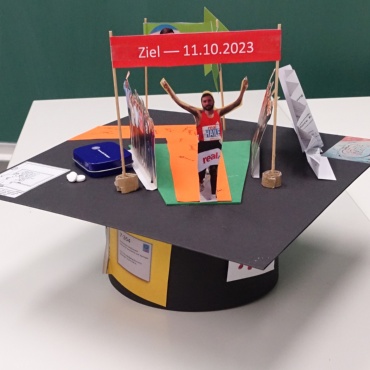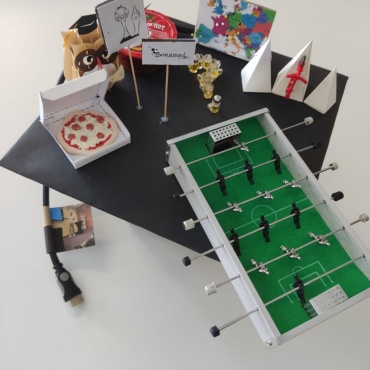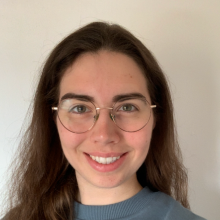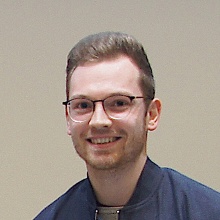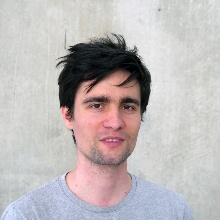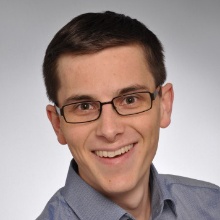Promotionen
Besonders interessierte und befähigte Studierende können nach dem Masterstudium ein Promotionsstudium anschließen. Etwa ein Viertel bis ein Drittel eines Jahrgangs entscheidet sich für diesen Schritt und bespricht dies direkt mit einer Professorin / einem Professor am Fachbereich.
Promovieren am Fachbereich Mathematik
Die rechtliche Grundlage für eine Promotion am Fachbereich Mathematik ist die Promotionsordnung (PO) der Universität Stuttgart. Bei Promotionen im Rahmen von Graduiertenschulen, wie zum Beispiel der Graduiertenschulen SimTech müssen zusätzlich die Vorgaben dieser Einrichtungen berücksichtigt werden.
- Informationen zur Promotion der Universität Stuttgart
- Registrierung, Antragstellung und Einschreibung an der Universität Stuttgart
(Dokumenten sind nicht barrierefrei)
Promotionsordnungen:
- Promotionsordnung PromO 2019 (English version)
- Promotionsordnung PromO 2016
Anlage:
Weitere Informationen
- Merkblatt zum Promotionsverfahren PromO 2019 (Englisch version)
- Merkblatt zum Promotionsverfahren PromO 2016 (English version)
- Katalog des Fachbereichs zur Anlage 2 der Promotionsvereinbarung
- Veröffentlichung der Dissertation - Hinweise der Universitätsbibliothek
- Richtlinie kumulative Promotion
- Campus Registrierung für Doktorandinnen und Doktoranden
- zur Bewertung von ausländischen Studienabschlüssen
- Publikationsrichtlinien der Universität Stuttgart
Eine Bewertung ausländischer Studienabschlüsse können sie hier vornehmen.
Abstracts zu Dissertationen am Fachbereich
Digital veröffentlichte Dissertationen können auf dem Dokumentenserver der Universität Stuttgart heruntergeladen werden.
| Tag der mündlichen Prüfung | Titel | Name |
|---|---|---|
| 01.07.2024 | Quasi Continuous Level Monte Carlo Method | Cedric Aaron Beschle |
| 26.04.2024 | Singular limits in KGZ systems and the DNLS approximation in case of quadratic nonlinearities | Raphael Taraca |
| 12.04.2024 | Long wave approximation over and beyond the natural time scale | Sarah Hofbauer |
| 05.03.2024 | Supercharacters and generalized Gelfand-Graev characters for orthogonal groups | Denis Weiler |
| 22.03.2024 | A Moving Mesh Finite Volume Method for Hyperbolic Interface Problems | Maria Alkämper |
| 15.03.2024 | Structure-Preserving Model Reduction on Subspaces and Manifolds | Patrick Buchfink |
| 29.01.2024 | Toric Cohiggs Bundles | Anderson Gama |
| Tag der mündlichen Prüfung | Titel | Name |
|---|---|---|
| 16.10.2023 | Faltungskalkül mit translationsinvarianten Amalgamräumen von Distributionen auf Euklidischen Räumen | Tillmann Kleiner |
| 11.10.2023 | Cartier-Foata-Garside Monoids and Groups | Alexander Thumm |
| 29.09.2023 | Deep and greedy kernel methods: Algorithms, analysis and applications | Tizian Wenzel |
| 25.07.2023 | Regression from Linear Models to Neural Networks: Double Descent, Active Learning, and Sampling | David Holzmüller |
| 06.07.2023 | Stability of Einstein Metrics on Homogeneous Spaces | Paul Schwahn |
| 30.06.2023 | On the uniqueness of the Calderón Problem and its application in Electrical Impedance Tomography | Ivan Mira Pombo |
| 12.06.2023 | Existence and non-existence of breather solutions on necklace graphs | Tobias Kielwein |
| 15.02.2023 | Characters and Character Sheaves of Finite Groups of Lie Type | Jonas Hetz |
| Tag der mündlichen Prüfung | Titel | Name |
|---|---|---|
| 20.12.2022 | Mixed-Dimensional Modeling of Flow in Porous Media | Samuel Burbulla |
| 14.12.2022 | Mathematische Modellierung von wellenoptischer Absorption beim Laserschneiden | Maximilian Klumpp |
| 08.12.2022 | Analysis of Hyperbolic Conservation Laws with Random Discontinuous Flux Functions and their Efficient Simulation | Lukas Brencher |
| 07.12.2022 | Subordinated Fields and Random Elliptic Partial Differential Equations | Robin Merkle |
| 26.10.2022 | On two Problems for the Stark Laplacian on domains | Jan Köllner |
| 14.10.2022 | Interface Conditions for Arbitrary Flows in Stokes-Darcy Systems: Derivation, Asnalysis and Validation | Elissa Eggenweiler |
| 22.09.2022 | The Phase Field Approach for Reactive Fluid-Solid Interfaces: Modeling and Homogenization | Lars Freiherr von Wolff |
| 18.07.2022 | Total Variation Minimization via Dual-Based Methods and its Discretization Aspects | Stephan Hilb |
| 28.06.2022 | From Short-Range to Contact Interactions in Many-Body Quantum Systems | Michael Hofacker |
| 14.02.2022 | Quantization of Algebras Defined by Ultradifferentiable Group Actions | Jonas Brinker |
| 08.02.2022 | Intrinsic Dimension Adaptive Learning Rates for Kernel Methods | Thomas Hamm |
| 01.02.2022 | Learning with High-Dimensional Data | Simon Fischer |
| 20.01.2022 | A Complete Analysis and Design Framework for Linear Impulsive and Related Hybrid Systems | Tobias Holicki |
| Tag der mündlichen Prüfung | Titel | Name |
|---|---|---|
| 02.12.2021 | Inhomogeneous Fractals as a Martin Boundary | Stefan Kohl |
| 18.11.2021 | Approximation with matrix-valued kernels and highly effective error estimators for reduced basis approximations | Wittwar, Dominik |
| 11.10.2021 | Algebraic analogues of resolution of singularities, quasi-hereditary covers and Schur algebras | Tiago Miguel dos Santos Cruz |
| 23.09.2021 | A Molecular – Continuum Multiscale Solver for Liquid – Vapor Flow: Modeling and Numerical Simulation | Jim Magiera |
| 22.07.2021 | A Bayesian Approach to Parameter Reconstruction from Surface Electromyographic Signals | Anna Rörich |
| 20.07.2021 | The stable module category inside the homotopy category, perfect exact sequences and equivalences | Sebastian Nitsche |
| 08.06.2021 | Absence of the Efimov Effect in Dimensions One and Two | Simon Barth |
| 19.05.2021 | Desarguesian and geometric right ℓ-groups | Carsten Dietzel |
| 28.04.2021 | Efficient simulation on challenging PDE problems on CPU and GPU clusters | Malte Schirwon |
| 22.04.2021 | Invasion phenomena in pattern-forming systems admitting a conservation law structure | Bastian Hilder |
| 21.04.2021 | LDD Schemes for Two-Phase Flow Systems | David Seus |
| 10.02.2021 | Compressible Multi-Component and Multi-Phase Flows: Interfaces and Asymptotic Regimes | Lukas Ostrowski |
| Tag der mündlichen Prüfung | Titel | Name |
|---|---|---|
| 18.12.2020 | Virtual Levels of Multi-Particle Quantum Systems and Their Implications for the Efimov Effect | Andreas Bitter |
| 01.12.2020 | Gendo-Frobenius algebras and comultiplication | Cigdem Yirtici |
| 01.12.2020 | On the Eigenvalues of the Non-Self-Adjoint Robin Laplacian on Bounded Domains and Compact Quantum Graphs | Robin Lang |
| 18.06.2020 | Uncertainty Quantification with Lévy-type Random Fields | Andreas Stein |
| 20.05.2020 | Stochastic Partial Differential Equations on Cantor-like Sets | Tim Ehnes |
| 14.05.2020 | Sparse Deep Gaussian Process Approximation and Application of Dynamic System Identification | Roman Föll |
| Tag der mündlichen Prüfung | Titel | Name |
|---|---|---|
| 17.12.2019 | Quantification of Uncertainties in Compressible Flows | Fabian Meyer |
| 27.11.2019 | Validity of the nonlinear Schrödinger approximation for quasilinear dispersive systems | Max Heß |
| 27.11.2019 | Resolution and Realisation Functors | Nico Stein |
| 19.07.2019 | Nonlinear phenomena on metric and discrete necklace graphs | Daniela Maier |
| 15.07.2019 | Improved Classification Rates for Localized Algorithms under Margin Conditions | Ingrid Blaschzyk |
| 12.07.2019 | Spectral Asymptotics for Dirichlet Laplacians on Random Cantor-Like Sets and on their Complement | Lenon Minorics |
| 11.07.2019 | Mesh Refinement for Parallel Adaptive FEM Theory and Implementation | Martin Alkämper |
| 03.07.2019 | Multiscale modeling and simulation of transport processes and electrochemical reactions in multimaterial porous electrodes | Katarina Link |
| 24.06.2019 | Amplitude Equations for Boussinesq and Ginzburg-Landau-like Models | Tobias Haas |
| 27.03.2019 | Spectral Asymptotics for Stretched Fractals | Elias Hauser |
| Tag der mündlichen Prüfung | Titel | Name |
|---|---|---|
| 31.07.2018 | Flow in Heterogeneous Porous Media: Fractures and Uncertainty Quantification | Markus Köppel |
| 16.06.2018 | Feedback Control for Parametric Partial Differential Equations Using Reduced Basis Surrogate Models | Andreas Schmidt |
| 03.05.2018 | Adaptive Higher Order Discontinuous Galerkin Methods for Porous-Media Multi-Phase Flow with Strong Heterogeneities | Birane Kane |
| 08.02.2018 | Randomization and Companion Algorithms in Stochastic Approximation with Semimartingales | Timo Pfrommer |
| Tag der mündlichen Prüfung | Titel | Name |
|---|---|---|
| 23.11.2017 | From classical absolute stability tests towards a comprehensiv robustness analysis | Matthias Fetzer |
| 13.10.2017 | Kernel-Based Expectile Regression | Muhammad Farooq |
| 11.10.2017 | Modeling and Analysis of Almost Unidirectional Flows in Porous Media | Alaa Amiti |
| 14.09.2017 | Minimal Orbits of Isotrophy Actions for the Classical Root Systems with Simply-Laced Dynkin Diagrams | Anton Reiswich |
| 13.07.2017 | Effective Equations in Mathematical Quantum Mechanics | Steffen Gilg |
| 06.07.2017 | WEB-Spline Approximation and Collocation for Singular and Time-Dependent Problems | Florian Martin |
| 24.05.2017 | Energy estimates for the two-dimensional Fermi polaron | Ulrich Linden |
| 25.04.2017 | Reduced Basis Approximation for Heterogeneous Domain Decomposition Problems | Immanuel Martini |
| 21.04.2017 | Killing and Conformal Killing Tensors | Konstantin Heil |
| 22.03.2017 | Self-Adjointness and Domain of a Class of Generalized Nelson Models | Andreas Wünsch |
| 14.03.2017 | Spectral and Hardy Inequalities for the Heisenberg Laplacian | Bartosch Ruszkowski |
| 07.03.2017 | Sylow Numbers in Character Tables and Integral Group Rings | Iris Köster |
| 03.02.2017 | Dominant dimensions of Algebra | René Marczinzik |
| 20.01.2017 | Supercharacter theories for Sylow p-subgroups 3Dsyl 4(q3), Gsyl 2(q) and 2Gsyl 2(32m+1) |
Yujiao Sun |
| Tag der mündlichen Prüfung | Titel | Name |
|---|---|---|
| 12.12.2016 | Failure of Amplitude Equations | Danish Ali Sunny |
| 12.07.2016 | The KdV and Whitham limit for a spatially periodic Boussinesq model | Roman Bauer |
| 02.03.2016 | Balance Laws: Non Local Mixed Systems and IBVPs | Elena Rossi |
| 29.02.2016 | Numerical Approximation of Two-Phase Flows with and without Phase Transition | Jochen Neusser |
| 16.02.2016 | Analysis of Liquid-Vapor Interfaces and Periodic Waves in Dynamical Lattice Systems | Buğra Kabil |
| Tag der mündlichen Prüfung | Titel | Name |
|---|---|---|
| 18.12.2015 | Liquid Vapor Phase Transitions: Modeling, Riemann Solvers and Computation | Christoph Zeiler |
| 30.10.2015 | Validity and attractivity of amplitude equations | Sanei Kashani |
| 28.10.2015 | Adiabatic theorems for general linear operators and wellposedness of linear evolution equations | Jochen Schmid |
| 21.07.2015 | Monotonicity-based methods for inverse parameter identification problems in partial differential equations | Marcel Ullrich |
| 13.07.2015 | Singular problems in quantum and elastic waveguides via Dirichlet-to-Neumann analysis | André Hänel |
| 02.06.2015 | Torsionseinheiten in ganzzahligen Gruppenringen nicht auflösbarer Gruppen | Leo Margolis |
| 12.05.2015 | Murphy bases for endomorphism rings of tensor space | Mathias Werth |
| 24.04.2015 | Statistical Learning of Kernel-Based Methods for non-i.i.d. Observations | Hanyuan Hang |
Habilitationen
Es gibt mehrere Wege, um Hochschullehrer/in zu werden: Typischerweise folgt der Promotion eine mehrjährige Post-Doc-Phase, in der weitere wissenschaftliche Leistungen erbracht werden. Anschließend kann eine Juniorprofessur oder eine Habilitation angestrebt werden.
Digital veröffentlichte Habilitationen können auf dem Dokumentenserver der Universität Stuttgart heruntergeladen werden.
| Datum | Titel | Name |
|---|---|---|
| 2022 | Silting objects and localisations | Frederik Marks |
| 2021 | On some enumerative problems on K3 surfaces | Davide Cesare Veniani |
| 2019 | Efficient numerical methods for total variation minimization | Andeas Langer |
| 2017 | On the behaviour of the eigenvalues and eigenfunctions of the Laplacian and related operators | James Kennedy |
| 2016 | Mathematical modeling of coupled free flow and porous medium systems | Iryna Rybak |
| 2015 | Entropy as a Fundamental Principle in Hyperbolic Conservation Laws and Related Models | Jan Giesselmann |
| 2015 | Nonlinear transport and coupling of conservation laws | Veronika Schleper |
| 2013 | On the elementary theory of Heller triangulated categories | Matthias Künzer |
| 2012 | Decoupling techniques for partial differential equations and the large-time behaviour of their solutions | Jens Wirth |
| 2011 | Justification of Approximation Equations for Pattern Forming Systems and for Water Waves | Wolf-Patrick Düll |
Promoviernde am Fachbereich Mathematik
Kontakt
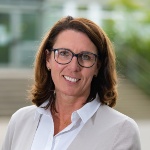
Elke Gangl
Prodekanat Mathematik




